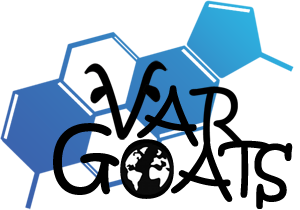VarGoats
Identification of Variations in Goat genomes related to domestication and adaptation

VarGoats is the first step of a 1000 goat genomes project and is lead by Gwenola Tosser-Klopp (INRA, France).
It is supported by FRANCE GENOMIQUE through a call for Large Scale DNA Sequencing projects. This means the scientific Consortium provides DNA and gets back genome sequences, generated at Genoscope (Evry, France). TGCC (Très Grand Centre de calcul du CEA) is the bioinformatic infrastructure where sequences will be stored and available for the Consortium. The data will be made available to VarGoats participants and data analysis will be performed in working groups already created in ADAPTMAP program or if needed in new working groups. Data will be used only for academic purposes, specifically for performing population genetics studies, for the investigation of diversity, domestication and adaptation traits, the discovery of variants (SNPs, CNVs, structural variants, causal mutations), the detection of selective sweeps, with the final goal to develop breeding solutions. Hybridization between species will also be studied, thanks to the availability of sequences from various capra species. At the end of the project, data will be released in a public database for research purpose only, even in case of no publication.
Data access
VarGoats is committed to sharing data rapidly, before publication. All participants have agreed to the VarGoats Data Sharing Statement for pre-publication data release.
To ask to become a VarGoats Participant, please fill this questionnaire.
To browse the available goats and to access data: data access.
Short description of the Scientific Consortium
- INRA, France
- Laboratoire d'Ecologie Alpine, France
- Parco Tecnologico Padano, Italy
- ARS, USDA, USA
- International Goat Genome consortium
- African Goat Improvement Network
- Roslin Institute and the Centre for Tropical Livestock Genetics and Health (joined the original Consortium in 2017)
Persons in charge of sequencing and data validation
Adriana Alberti, Stefan Engelen and Céline Orvain, Génoscope, France.
Edinburgh Genomics Clinical, Univeristy of Edinburgh, UK.
Short description of sampling
193 French domestic goats from the following breeds: Saanen, Alpine, Angora, Poitevine, Corse, Fossés, Rove, Provençale, Créole, Pyrénéenne, Massif Central, Boer, Péi, Lorraine, 6 other International breeds.
199 international goats sampled in 15 relevant gene pools, 2 inbred breeds and other Capra species.
286 goats from the AGIN project, that will be sequenced at the Roslin Institute.
Additional data contributing to the project
207 goats from NextGen project.
443 goats from public databases.
44 goats from other sources.
Available datasets
- Nov, 20201,372 samples
- Nov, 20201,159 samples, one duplicate was removed from the 1,160 dataset
- Sept, 20191,160 samples
- Dec, 2018829 samples
- Sept, 2018594 samples
- Dec, 2017248 samples
Non exhaustive list of sample providers
- Jim Reecy and Muhammad Moaeen-ud-Din, Pakistan
- Marcel Amills, Amparo Martinez, Vincenzo Landi, Felix Goyache and Isabelle Alvarez & Armand Sanchez, Spain
- Alessandra Stella, Paola Crepaldi and the Italian Goat Consortium: Alessandra Crisà, (IGC-Crea, Italy), Donata Marletta (IGC- UNICT Italy), Tonello Carta (IGC-Agris-Sardegna, Italy) and Paolo Ajmone Marsan (IGC-UNICATT, Italy)
- James Kijas, Australia
- Christine Flury, Cord Droegemueller, Switzerland
- Capgenes, Daniel Allain, Michel Naves, Isabelle Palhière, Rachel Rupp & Gwenola Tosser-Klopp, France
- Vivi Hunnicke Nielsen & Bernt Gudbrandtsen, Denmark
- Hans Lenstra, The Netherlands
- Jon Hallsteinn Hallsson, Iceland
- Carina Visser, South Africa
- Seán Carolan, Old Irish Goat Society, Ireland
- Dylan, Duby, Museum d’histoire naturelle, France
- Michele Ottino, Parco National Gran Paradiso, Italy
- Ben Rosen, AGIN, USDA, Africa
Summary
Goats were domesticated ~10,000 years ago from their bezoar wild ancestor bezoar. Currently, there are more than 1,000 goat breeds worldwide, and most of them are adapted to various environments and/or selected for production traits. Through the generation of domestic breeds sequence data and their analysis together with existing data (domestic and wild animals), this collaborative project aims at exploring genetic diversity, detecting adaptation, domestication and selective sweeps and characterizing functional mutations in various goat breeds through single base, copy number and structural variants analysis.
Detailed description of the Scientific Consortium
Detailed description of sampling
Acknowledgements
André Eggen, Illumina, for providing 192 goat SNP50 Beadchips.
Département de Génétique Animale, INRA, for supplying genotyping costs through VarGoats2 action.
BBSRC Global Challenges Research Fund Data and Resources Grant BBS/OS/GC/000012F awarded to the Roslin Institute for « Reference genome and population sequencing of African goats ».
